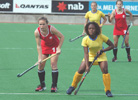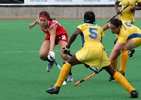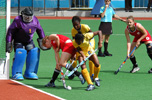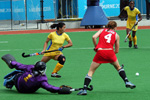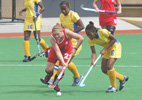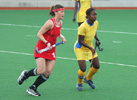Barbados - First steps on the big stage
In his second piece, Michelangelo Rucci met up with the Barbados women's team making its first appearance on a big stage and finding out that sport isnít always just about winning. Sometimes, just sometimes, it is not about the winning. It is not, as Bill Shankly, the former Liverpool Football Club manager, famously declared, always a case of life and death and more, much much more, to win in sport. Sometimes, just sometimes, the noble Baron de Coubertin notion that competing is in itself success applies. Perhaps no more so than at the Commonwealth Games, where every four years ''the other half'' gets to move about with the elite. Like Barbados. Ranked No. 28 in the world, the Barbadian women arrived in Melbourne for their first Commonwealth Games courtesy of the good grace of the Barbados Olympic Association (quite a twist) paying their airfares. They left their Caribbean island amid protests in the media of money being wasted on a futile mission. They returned home having turned that expense into an investment. "Not having international competition puts us back quite a lot," says 24-year-old Barbados midfielder Tricia-Ann Greaves. "This is the first time we've been to a major competition". "It's overwhelming, but we're sticking to the task," added Greaves midway through the Barbadians' campaign that had brought the rarely sighted Barbados to the pitch against Canada, New Zealand, England and Scotland in pool matches.
The basic scorelines, like the 10-0 loss to England, would have been more fuel for the debate firing off keyboards back in Barbados. But when the 16 women unpack their sticks at home, they will have gained from taking part in Melbourne a prize that will last longer than the lustre of the gold, silver and bronze medals won at the Commonwealth Games. Experience of top-level international for Barbados, a team that from 2004 to the Commonwealth Games had played in just one tournament, is priceless. "It helps to know what's out there, what we have to do to get better," says Greaves. "We're left with a goal, something to reach for." Barbados qualified for Melbourne 2006 on the Commonwealth requirement that the highest-ranked nation in each continental zone be invited to the multi-sport festival that took on hockey in 1998 in Kuala Lumpur. But being higher ranked than local rival Trinidad & Tobago this time was the easy part. There was B$4700 to be found for each team member to get them to Melbourne and back. Another B$2000 for each player's equipment and uniforms. Then, for a nation that has club hockey teams arrive from Europe and North American for the annual Banks Festival on the island rather than international squads for serious play, it had to chose from 38 players, four of whom are in Europe, to make up its Commonwealth Games team. By the grace of the Barbados Olympic Authority, the sacrifices for its 16 players were more of time than money. "Most of us have jobs, from eight to four," says Greaves, a marketing specialist with IBM. "Five days a week you are rushing from work to training and getting home at 10. It is demanding." Barbados Hockey Federation president George Adolphus Bennett, who has been in charge since 20 January, sat through the Commonwealth Games wondering how much Melbourne 2006 would contribute to developing hockey from a school sport to a club game with greater appeal to the girls traditionally tempted by netball and volleyball. "You are not going to see us reach the Olympic Games; this (the Commonwealth Games) is the highest we can get," said Bennett. "It is a great achievement for us to get to such an important tournament" "This is as big as it gets for us. And the benefits are tremendous. How else do we get to compete at this level of international hockey to be introduced to different techniques? It has to help hockey develop in Barbados" "We have young players back in Barbados who now have something to aim for. They can see a pathway to top-level competition. And that is why our participation here was one opportunity we were not going to give up just because we were not going to win the title nor finish in the top three." Indeed participation sometimes is more important than winning.
| |||||||
| |||||||
 Unlike the Olympic Games and the World Cup, the Commonwealth Games, which is staged every four years, mixes the elite with the not-so-often-seen minnows of international hockey.
Unlike the Olympic Games and the World Cup, the Commonwealth Games, which is staged every four years, mixes the elite with the not-so-often-seen minnows of international hockey.
